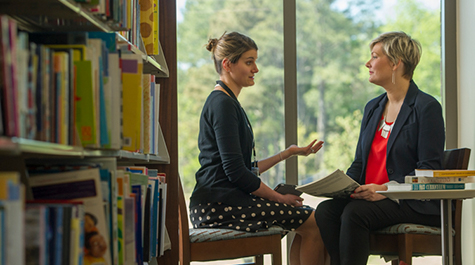Lindy Johnson receives Divergent Award for Excellence in 21st Century Literacies
Literacy has to expand beyond reading and writing to include digital literacy, argues William & Mary assistant professor Lindy Johnson. She recently received the Divergent Award for Excellence in 21st Century Literacies for her work and advocacy around the necessity of educating K-12 students to be both better consumers and producers of digital media.
“I work very closely with teachers and young people to find out how they can leverage technology for the greater good. Students need tools to critically analyze the images and texts they are surrounded by in online spaces, especially their social media feeds,” said Johnson.
Johnson, who began her career as an educator in Boston, Massachusetts, in the early 2000s, has witnessed the rapid expansion of digital communication, with all its potential and pitfalls.
“I was really excited about the potential for digital tools to engage students in academic content while also connecting them with different communities. I also saw that my students genuinely enjoyed using technology. When I began work on my PhD, my focus was on helping teachers think about leveraging technology to engage young people in more authentic, inquiry-based projects. But, there have been a lot of unintended consequences. The early promise of technology to democratize the educational landscape has not been fulfilled,” she said.
Johnson is committed to continuing to develop tools and techniques that can help students navigate a screen-soaked world.
“A lot of students and even adults are unable to distinguish between fact and fiction online,” she said. Future literacy work will have to include giving students the tools to make that distinction.
“Critical thinking skills are really important in digitally mediated environments,” she explained.
“The other piece that is really important is giving youth the opportunity to create and get their voice out there,” she said. Johnson has been working with young people as part of the National Writing Project’s Letters to the Next President program. As part of this project, young people were challenged to identify an issue that concerned them, research it, and take a stand on it, as if the next president or policymakers would be reading or viewing their work. Youth created videos tackling topics ranging from air pollution to cyber bullying to the Black Lives Matter movement.
In addition to being a creative challenge, the entire project hinged on honing digital literacy skills.
“Before the students researched and produced their videos, they practiced identifying credible sources,” said Johnson, explaining that the students learned the CRAPP test, which requires checking currency, reliability, authority, purpose and point of view in materials they found online.
“That was very illuminating to them because they often believe that if something is on the internet, it must be true. This really gets them thinking about bias in media. All news sources have a point of view but it’s really important to be able to track that to the source,” she said.
“It was exciting to see students so engaged in issues that are impacting them and their communities,” she said. Johnson is currently working on a qualitative analysis of the self-reported experience of 90 students who participated in the project. Her final analysis will be multi-modal, including not just the students’ experiences but their video products as well.
Johnson also considers the ways in which parents can empower students in their digital lives. She recently participated in a panel titled "Parenting in the Age of Screen Time" as part of a group of researchers in the field who are also parents.
“One takeaway from that panel is that there is a difference between passively consuming content on one’s device versus using technology to create content or connect with other human beings. There is early research that suggests that in terms of wellbeing and depression and anxiety, getting kids to connect with other people, and getting them to produce things – documentaries, videos, fan fiction – is far more beneficial than time spent scrolling through Instagram and comparing how great everyone’s life is compared to yours,” she said.
Ultimately, she pointed out, we are engaged in a huge experiment. Some school districts provide quite advanced technology that enables students to fully explore their creativity in a digital space, and some districts can’t provide that technology for anything beyond required testing, so their students may have a completely different relationship with tech. Johnson’s dissertation examined the use of digital tools in a rural school environment where one in three students did not have internet access at home.
“There is a huge inequity of resources and opportunities,” she said. Johnson hopes her work will ultimately address some of that inequity by giving students the knowledge and confidence to identify truth and speak their own truth in an increasingly digital world.
